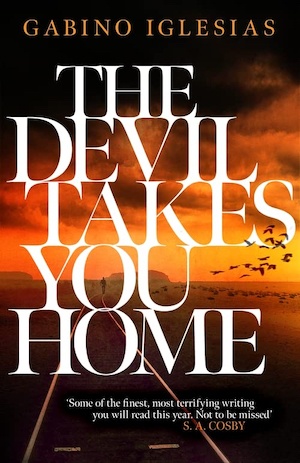
Texan author Gabino Iglesias’ two previous novels, Coyote Songs and Zero Saints, earned him an enviable reputation for being able to blend genres. Writers who can pull this off successfully – like Elizabeth Hand, Laird Barron and Cynthia Pelayo – manage to meet readers’ expectations for what a good crime novel should provide while also delivering horror chills. I was eager to see if Iglesias could repeat the trick for his mainstream publishing debut, described as Breaking Bad meets Stephen King. I’m pleased to report he doesn’t disappoint.
When we meet Mario, he seems unremarkable. He is happily married to Melisa with whom he’s had a daughter, four-year-old Anita. His job at the insurance company is boring but undemanding, and just about manages to keep the wolves from the door. He discovers just how fragile his security is when Anita develops a serious illness and the family’s medical insurance doesn’t even begin to cover the hospital bills.
As Anita’s health deteriorates, Mario’s control over his life crumbles away. An unsympathetic employer terminates his job for too many absences and his marriage begins to fail under the strain of mounting bills. In desperation, he reaches out to his old friend Brian, a meth addict and small-time criminal. And so, in true noir fashion, Mario takes the first steps on the road to damnation.
Mario agrees to kill a man. While the job is successful, the pay makes barely any inroad into his debts. When Anita dies and Melisa leaves him for assaulting her, Mario descends into hopelessness but continues working for Brian. Becoming increasingly tired of this life of crime, and of himself, Mario doesn’t hesitate when Brian dangles the carrot of one last big job in front of him. The chance to score big and perhaps win Melisa back – already, he is lying to himself – is too great to resist, and he agrees to meet Brian’s contact, Juanca.
It is the introduction of the Mexican gangster, quiet and reserved at first but becoming increasingly confident and threatening as the story progresses, which really kicks The Devil Takes You Home into high gear. Though necessary to set the story up, the early chapters are a little hard going and too one-note. Even the most accomplished of authors would struggle to engage readers with a beginning of almost unrelenting misery. Perhaps some happier family scenes mixed in early on would have lightened the load and given more meaning to their family life.
When he arrives, Juanca drives the story and the trio head toward the Mexican border. His plan is for the three of them to hijack a cartel van carrying the returns of a drug deal. The money from the resulting three-way split really would be life changing for Mario.
It is here that Iglesias introduces his horror elements – founded, I believe, on South American folklore that deals with witches and sacrifice. He creates an atmosphere of dread and dares the reader not to look away in a fashion reminiscent of Don Winslow’s Cartel trilogy, which began with The Power of the Dog. The Devil Takes You Home might just be the only thriller I have read which matches the intensity of the violence in those three books. It really is not a read for the faint-hearted.
Iglesias’ book is more than just a pulpy read. The killer ending is a reminder of his mastery of the noir format, and the novel is thematically rich in its portrayal of everyday racism, and of a capitalist system that sees people as a resource to be consumed and discarded. After a slow start, this is a story told with verve and a style all its own, The Devil Takes You Home is one of those books that gets better the more you think about it.
The Devil Takes You Home was featured in our article on 2022’s most anticipated books.
Mulholland / Wildfire
Print/Kindle/iBook
£8.99
CFL Rating: 4 Stars










